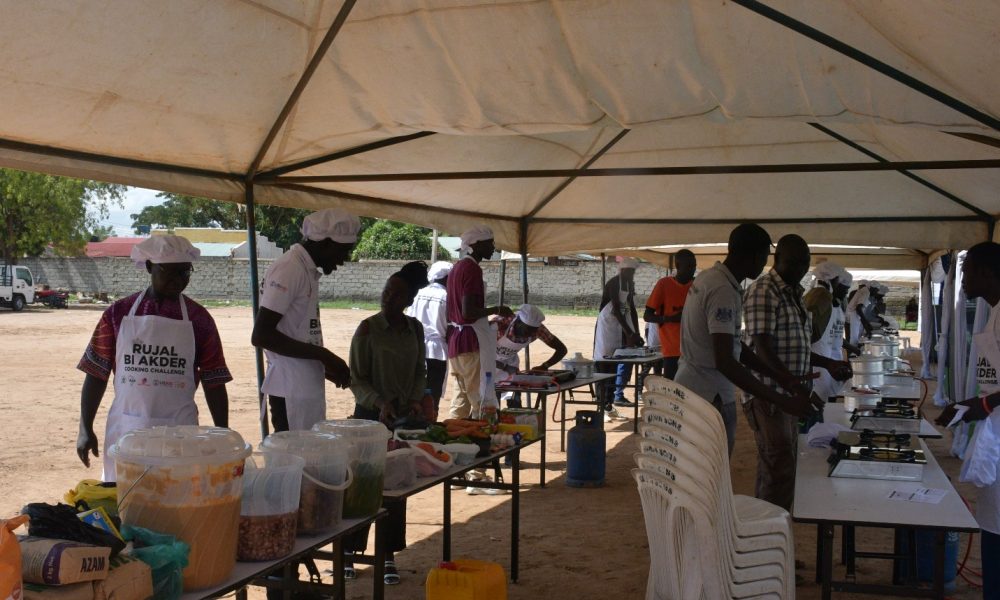By Gladys Fred Kole
Men have been urged to take up the duty of cooking instead of only waiting for their spouses to travel or fall sick before assuming responsibility to cater for their loved ones.
This was the message from country representative of UNFPA, Dr. Ademola Olajide, during a men-led cooking challenge on Friday.
The cooking challenge dubbed “Rujal Bi Akder” was convened by the national Ministry of Gender, Child and Social Welfare, in partnership with Men4women, with support from the United Nations Population Fund through SAADO.
The event was the outcome of a recent men’s conference where men discussed challenges they faced within society and responsibilities they had that they could share.
It aims to change perceptions about cooking and other aspects of life, highlighting that it is not a problem when women cook but only becomes a problem when its only women cooking.
Ademola emphasized that peace within society should start with peace at home, and men must be active participants in the peace-building process.
The importance of this act is to show South Sudanese that cooking is a skill that men can also participate in, and that there’s nothing wrong with anybody cooking, he said.
“What we have here today are men who are demonstrating that those social barriers that have hindered women from attaining their full potential that those barriers can be broken,” he said.
“I totally subscribed to this attempt by society to prescribe order. What we do not agree with is people should be put at a disadvantage because of the social norms that have been set.”
He said men can also create an environment where women can actively contribute to socioeconomic development.
For her part, the minister of Gender, child and social welfare Aya Benjamin Warille said that the act is going to change the perception in society.
“It is important that for us to have gender equality some of these assigned roles which are used against girls and women can be used to create equality instead of inequality suppressing women using these assigned roles. We can use it positively to send a positive message that we are equal and everyone else that’s why it is themed Rujal Bi Akder,” she said.
Aya said it is not a problem when women cook; it only becomes a problem when its only women cooking. Everybody eats so anyone else can cook.
“The importance is to show us South Sudanese that cooking is the role that the society assigned to girls and women, but it is a skill that men can also participate in,” she explained.
Meanwhile, Ladu John James commonly known as Jay Jay, a participant of the day, argued that men should not be limited to the African tradition of referring to cooking as a women’s job.
He encouraged men to enter the kitchen and join in helping instead of buying food from outside.
Jay cited his own experience of cooking “Basiko” at the event, having done it several times with eggs and meat.
Gift Godfrey Moju, a participant, believes that he can personally break the belief that cooking is for women.
He believes that coming to the public is not about proving a point but rather about continuing to do it, as it will make sense if he doesn’t do it tomorrow.
“Women have to understand that we as men can give a helping hand, count on us for support when you feel your down and can’t cook or do household chores anymore inform and we shall enter and cook for you,” Jay cited.
Cooking a local dish “Basiko” at the event was not the first time for Jay, he has done it severally with eggs, meat but yesterday he chooses to prepare it with Sim Sim.
“I started cooking when I was 8 my mother left me home with my siblings, and they became hungry so the first thing I did was to cook rice unfortunately I burnt it, after that I started sitting next to my mom to learn and cooking is fun, you just need to love it,” he narrated.
Gift emphasized that cooking is not just for women, but for men, and that women can do it better than men.
Gift Godfrey Moju, echoing Jay Jay’s sentiments, also shared his desire to challenge stereotypes and debunk the notion that cooking is exclusively for women.
Raised by an African mother, Gift and his siblings embraced household tasks traditionally associated with women, such as cooking and cleaning.
“Coming to the public is not about proving a point but then it’s something I have to carry on with because it won’t make sense if I don’t do it tomorrow which means I will be lying to myself,” Gift
This event united men from various backgrounds and capacities, each showcasing their skills and preparing countless of delicious dishes.
While it is true that cooking has often been associated with women, men must acknowledge that it is a skill that transcends gender boundaries. Men, too, can embrace the art of cooking and actively participate in the kitchen.




